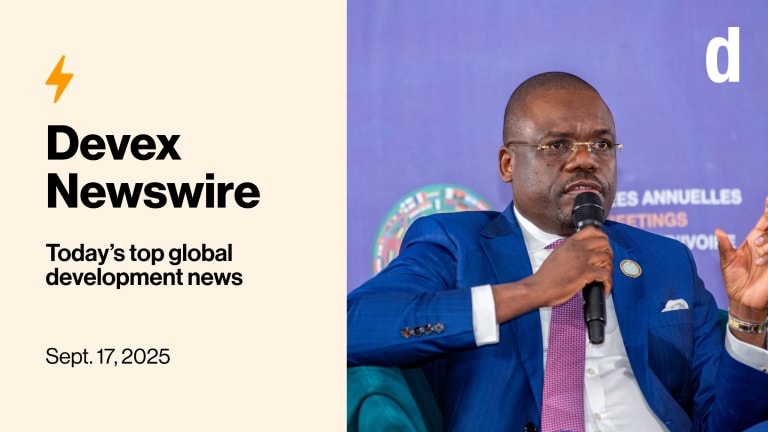
NEW YORK — Eye health care workers worldwide are being dispatched to support the global response to the novel coronavirus pandemic, according to Nick Martin, deputy CEO at Australian vision nonprofit The Fred Hollows Foundation.
“Hopefully emerging from all of this, we will see that health becomes a priority once again. … And eye health is an integral part of that.”
— Nick Martin, deputy CEO, The Fred Hollows FoundationThe spread of COVID-19 has placed all of the organization’s standard eye care prevention and treatment work on hold, Martin told Devex in a recent interview. But the thousands of health workers supported by the foundation are now contributing to the coronavirus response, whether in hospitals or through community engagement.
► Study highlights Rohingya eye care demand
► Opinion: Measure what matters — not just what's easy
► Opinion: How do we tackle a disease that most people don’t know they have?
“All efforts are being redirected into the response to COVID-19. And we're seeing our own efforts and our partners also being redirected in that way,” Martin said, adding that in most of the countries where the organization is working, eye health services have been suspended for now “so that people can really concentrate on fighting the virus.”
The shift extends from primary health care workers who would normally do eye health promotion, to doctors who perform eye surgeries in health clinics.
“Obviously, it's an unprecedented health crisis around the world. And that just completely changes the way health systems everywhere across the developing world are responding to this,” Martin continued.
The organization works to end avoidable blindness by training health care workers in more than 25 countries across Africa, Asia, the Middle East, Australia, and the Pacific islands. In 2018, it trained nearly 60,000 people — including surgeons, community health workers, and teachers — and supported 929,106 eye operations and treatments. According to the World Health Organization, approximately 1 billion people globally have vision impairments that could have been prevented or are unaddressed.
A steady stream of national lockdowns to curb COVID-19 recently pushed The Fred Hollows Foundation, alongside many other development organizations, to suspend nonemergency fieldwork.
“What we’re seeing is the mobilization of an entire health system in the country. And it's really drawing on the best expertise that they can find. Sometimes that is even in eye health,” Martin said.
Ophthalmology has several areas of crossover with COVID-19 prevention and treatment; one reported symptom of the disease is a mild case of conjunctivitis, some reports have shown.
“It's not common in all cases of COVID-19, but we're seeing even people turning up to eye health services in some countries with COVID-19 and these atypical symptoms,” Martin said.
Eye care specialists use water, sanitation, and hygiene practices to prevent trachoma — a highly contagious bacterial infection — echoing the hand-washing standards recommended for COVID-19 prevention.
In Vietnam, the foundation has grounded its operations in trachoma, but the national government has redirected eye care workers to do COVID-19 community education and awareness, according to Martin. In Cambodia, senior ophthalmologists and other eye health experts have become involved in policy development and “playing a role in some of the coordination aspects of the COVID-19 response,” Martin said.
COVID-19 — a timeline of the coronavirus outbreak
Follow the latest developments on the new coronavirus that causes COVID-19.
Meanwhile, private eye health clinics in Kenya are being used to treat any patients who display COVID-19 symptoms and either treat them within isolated units at the clinics or refer them to other providers, Martin said.
“If there's an agenda that emerges from this crisis, it's that governments [and] funders around the world really should be looking at how integral, how strong, national health systems are as a whole so they can be more responsive in times of need like this,” Martin said.
A lot of primary health workers really can be quickly repurposed and retrained to promote prevention and safety messages around COVID-19, according to Martin. “Making sure that people have got the tools to be able to clean themselves, wash their hands, and help stop the spread of the virus is a really important way that we can redirect some of our programs,” he said.
The number of visually impaired people around the world is expected to continue growing over the next 30 years, Martin said, requiring a rapid return to the foundation’s standard work at “the moment COVID-19 passes.”
His hope, though, is that the pandemic encourages the global community to better prioritize health in the years to come and to look at the ways that different diseases hold people back.
“Hopefully emerging from all of this, we will see that health becomes a priority once again for funders and donors. And eye health is an integral part of that,” Martin said.
Devex, with financial support from our partner Essilor, is exploring challenges, solutions, and innovations in eye care and vision. Visit the Focus on: Vision page for more.

Search for articles
Most Read
- 1
- 2
- 3
- 4
- 5








